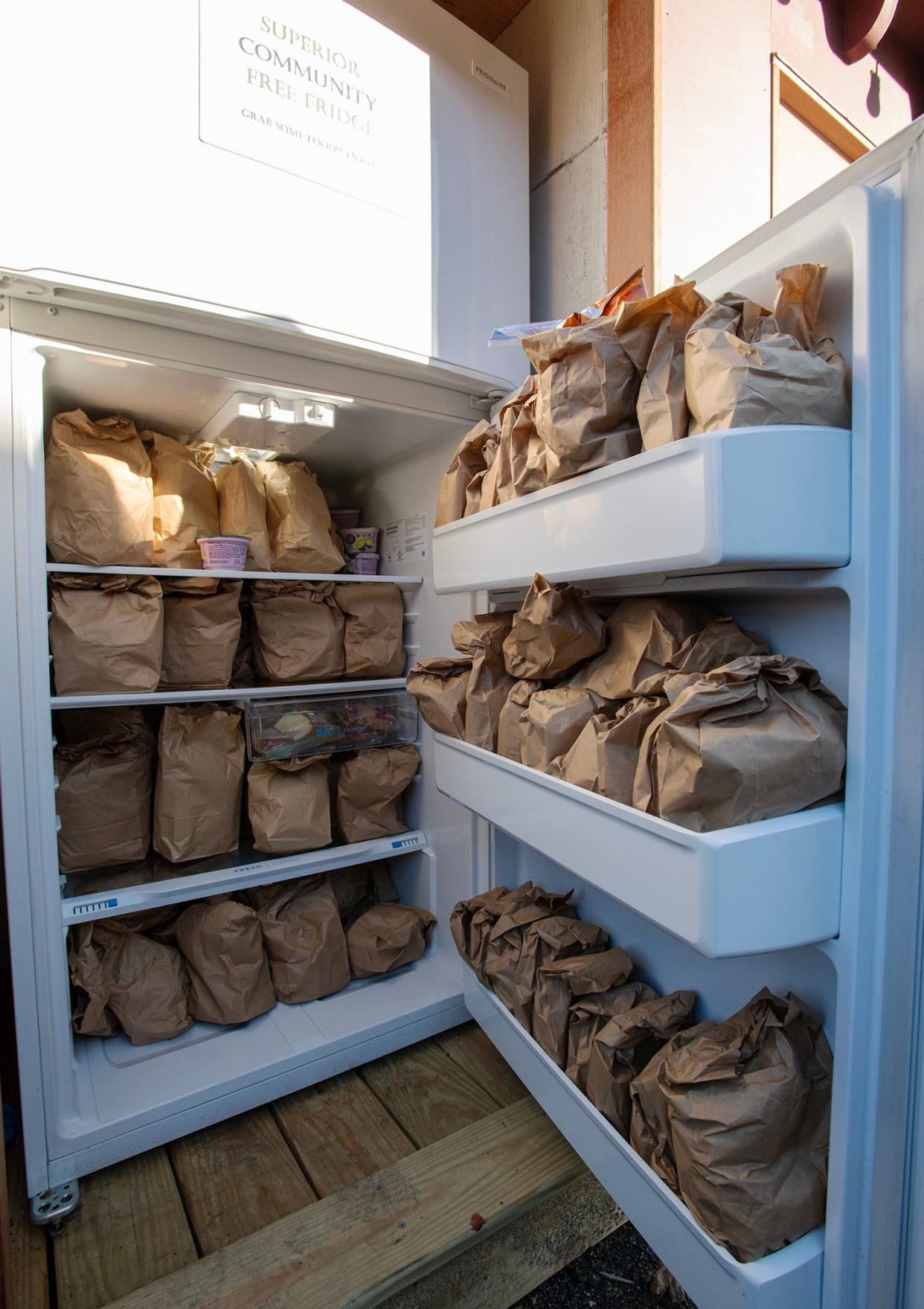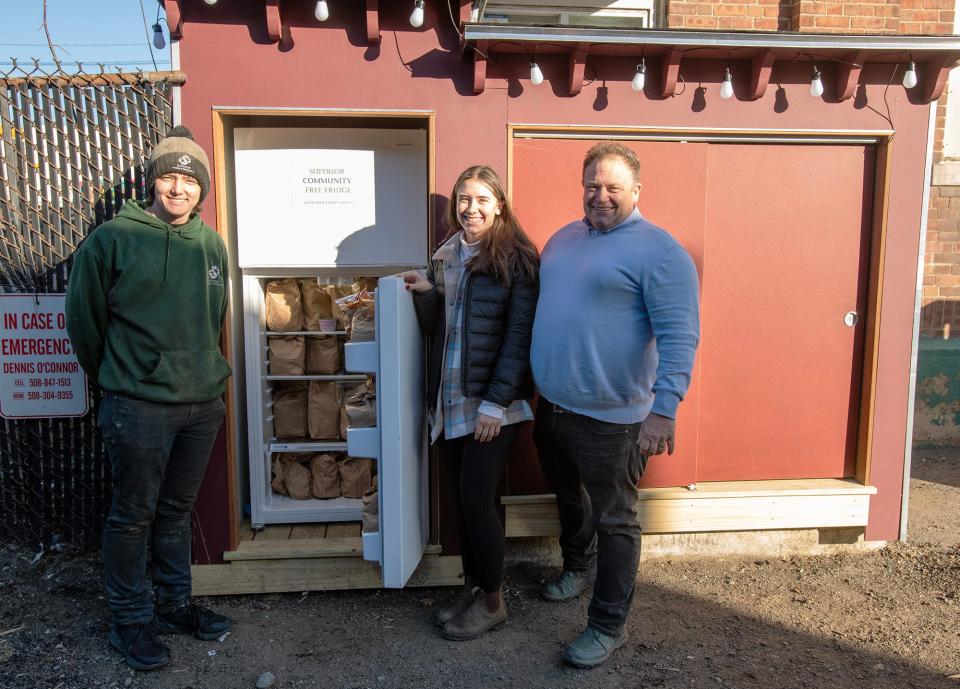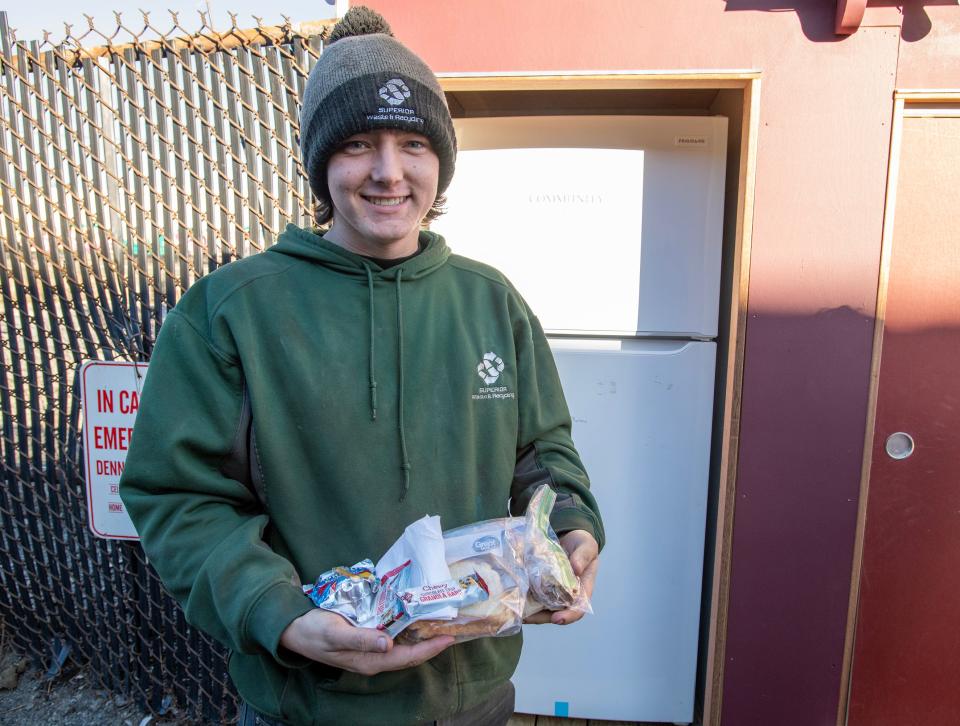Another Woo Fridge in Worcester: this one feeds the homeless

WORCESTER – Kansas Street is a busy place. It's a gritty area full of commercial activity with trucks frequently coming and going.
Amid the bustle is an item that is helping some of the city’s most vulnerable residents. It’s a refrigerator that sits outside of Superior Waste & Recycling, a business that rents dumpsters and removes junk.
Terry O’Connor, whose family owns Superior, reached inside the fridge and pulled out a bag. It looked just like the brown-bag lunch many of us carried to school when we were kids and it was full of goodies including a peanut butter and jelly sandwich, two granola bars, a slice of banana bread and a drink.
Terry wasn't going to eat the stuff because it’s not for him, his sister, Maggie, or his father, Dennis, who owns Superior.
'It's important to give back'
The brown-bag meals — dozens were jammed in the fridge — are for anyone. But they’re primarily for the unhoused who make the nearby streets their home. They walk by, open the fridge and grab a free meal. Or they take a few meals back to their friends.
“It’s important to give back to the people around us, that we see every day in need,” said Terry O’Connor.

The fridge was donated by Woo Fridge, also known as Worcester Community Fridges, which really isn’t a business or a nonprofit, said Julia Karpicz.
Karpicz is one of several volunteer organizers at the Woo. She described the work being done as a “mutual aid effort” where neighbors volunteer their time to take care of each other.
A total of five Woo Fridges are scattered around Worcester, all located outside and on private property. The food stocked inside comes from a variety of places. In the case of the fridge outside Superior, the O’Connors have a network of family, friends and churches that cook and prepare the meals.
Superior is the "host" of the fridge. Each fridge has a business or organization that serves as host, responsible for providing the necessary space and paying the electric bill that keeps the fridge running. Woo Fridge receives cash and in-kind donations that pay for the fridges, repairs and replacements.
Other food suppliers include farms, grocers and local restaurants with an oversupply of fresh, healthy foods that would otherwise be thrown out. Or it can be as simple as someone walking home from the supermarket, seeing one of the fridges, feeling benevolent and reaching into their grocery bag and tucking an apple or loaf of bread inside.
“Take what you need, leave what you can” is the organization’s motto and anyone can supply what they have and take what they need at any time because the fridges are open 24/7.
Woo Fridge's most recent financials included an estimated annual budget of $52,000 from November 2022 to December 2023 and more than $70,000 in donations. The figures were reported on Open Collective Foundation's website, which serves as the Woo's fiscal sponsor.

Food insecurity in Worcester
Woo Fridge is needed in Worcester because nearly 13% of city residents were food-insecure in 2018, according to a study by the Worcester Regional Research Bureau. The same study expected a jump to 18% in 2020.
Surveys conducted by the Massachusetts Department of Public Health and UMass Chan Medical School showed one in five Worcester residents (20%) was food-insecure last year.
How Woo Fridge started, said Karpicz, can be traced back to Maria Ravelli, who put out a social media message in 2020 looking for someone to partner with on a community fridge. Fantastic Pizza & Cafe answered the call and the first fridge was in business.
It lasted a couple of years at the pizza shop’s location at 910 Main St. in the Main South neighborhood before it shut down in August. At the time, the Telegram & Gazette reported Woo Fridge's Facebook page had expressed bitterness toward city officials about the closing, attributing the move to "a city that hates poor people."
In an email correspondence with the Telegram at the time, Woo organizers would not elaborate on either the decision to close or the comments made about the city.
For this story, Karpicz explained the closure: “Operating a fridge at a restaurant brings logistical challenges. The expectation they have for food and food waste, other businesses don't have."
Woo Fridge wants a replacement fridge in that area of Main Street and is looking for a host partner to make it happen.
Other current fridge locations include 44 Portland St. outside of the Printers Building, 16 Brooks St. in the Greendale area and 42 South St. in the Union Hill neighborhood. That fridge has solar panels on it as a source of electric power. It also has a small nook to drop off and take used books.
There’s one more fridge, the newest one that opened this summer, outside St. Matthew’s Church at 695 Southbridge St.
Data: Fridges are being used
As for how many people use the fridges, Woo Fridge enlisted the help of Worcester Polytechnic Institute students who developed a magnetic sensor that showed the Union Hill fridge opened more than 800 times in December 2022.
Personal information about who uses the fridges is not gathered to protect privacy. Woo Fridge sees each fridge as a source of food for all, at any time, no matter who you are.
On the point of who safeguards the freshness of the foods inside the fridges, Karpicz said there is no official partnership with the city to ensure it. Volunteers check on the foods and remove any that aren't fresh.
Karpicz noted an additional safeguard for freshness: the federal Food Donation Improvement Act that was signed into law by President Biden in January.
The act builds on the Bill Emerson Good Samaritan Food Donation Act that was passed in 1996, according to the Center for Health Law and Policy Innovation at Harvard Law School. The Emerson Act encourages companies to donate surplus food to nonprofits. That is accomplished by giving liability protection — both civil and criminal — to food donors and nonprofit intermediaries.
The Food Donation Improvement Act would enhance liability protection in two ways. It protects donations at a good Samaritan price that doesn't exceed the cost of handling, administering, harvesting, processing, packaging, transporting and distributing the food.
It also advances protections to certain donations given by food businesses, those that are already required to comply with food safety requirements, directly to those in need. Currently the law protects donations to nonprofits that farm out the food to food-insecure people.
The goal of strengthening the Emerson Act is to increase food donations and reduce food waste.
'Giving back makes me feel great'
Dennis O’Connor spoke proudly about the fridge outside his business and "forever” was his answer when asked how long he and his family plan to keep the fridge stocked and running.
“Giving back makes me feel great,” he said.
Contact Henry Schwan at henry.schwan@telegram.com. Follow him on X: @henrytelegram.
This article originally appeared on Telegram & Gazette: Woo Fridges feed homeless community in Worcester

